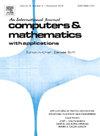扩散Lotka-Volterra种群模型的非局部延迟竞争时空动力学
IF 2.5
2区 数学
Q1 MATHEMATICS, APPLIED
引用次数: 0
摘要
在非局部延迟竞争的影响下,我们研究了扩散Lotka-Volterra种群模型的时空动力学。根据某些参数值的不同,原模型可分为Lotka-Volterra捕食者-猎物模型、合作种群模型或竞争种群模型。然后,通过特征方程分析,我们发现当原始模型为Lotka-Volterra合作种群模型或竞争种群模型时,非局部延迟竞争可以推断出图灵-霍普夫分岔的存在。然而,当原始模型为Lotka-Volterra捕食者-猎物模型时,非局部延迟竞争不能推导出图灵-Hopf分岔的存在,但延迟可以推导出稳定性开关和Hopf分岔的存在。此外,据我们所知,在已知的文献中,对非局部延迟竞争的反应扩散模型的研究较少,这意味着我们的结果是新的。最后,通过一些数值计算和仿真,得到了空间齐次稳定周期解、空间稳态解、空间非齐次周期解和由延迟导出的稳定性开关的丰富结果。本文章由计算机程序翻译,如有差异,请以英文原文为准。
Spatiotemporal dynamics deduced by nonlocal delay competition in a diffusive Lotka-Volterra population model
In this article, under the influence of nonlocal delay competition, we are devoted to investigating spatiotemporal dynamics of a diffusive Lotka-Volterra population model. According to the different values of some parameters, the original model may be changed into Lotka-Volterra predator-prey model, cooperative population model, or competition population model. Then, through the characteristic equation analysis, we find that nonlocal delay competition can deduce the presence of Turing-Hopf bifurcation when the original model is Lotka-Volterra cooperative population model or competition population model. However, when the original model is Lotka-Volterra predator-prey model, nonlocal delay competition cannot deduce the presence of Turing-Hopf bifurcation, but delay can deduce stability switches and the presence of Hopf bifurcation. Moreover, in the known literatures, to our knowledge, reaction-diffusion model with nonlocal delay competition has been investigated more rarely, which implies that our results in this paper are new. Finally, by presenting some numerical calculations and simulations, we obtain the rich results of stable spatially homogeneous periodic solutions, spatially steady state solutions, spatially inhomogeneous periodic solutions and stability switches deduced by delay.
求助全文
通过发布文献求助,成功后即可免费获取论文全文。
去求助
来源期刊

Computers & Mathematics with Applications
工程技术-计算机:跨学科应用
CiteScore
5.10
自引率
10.30%
发文量
396
审稿时长
9.9 weeks
期刊介绍:
Computers & Mathematics with Applications provides a medium of exchange for those engaged in fields contributing to building successful simulations for science and engineering using Partial Differential Equations (PDEs).
 求助内容:
求助内容: 应助结果提醒方式:
应助结果提醒方式:


